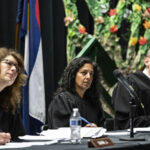Following SCOTUS decision, judge enters injunction against Colorado in 303 Creative case
Nine months after the U.S. Supreme Court handed down its decision and nearly eight years after she first filed suit in Colorado’s federal trial court, web designer Lorie Smith received an injunction prohibiting the state from compelling her to create wedding websites for same-sex couples.
In a March 26 order, U.S. District Court Chief Judge Philip A. Brimmer rejected language that would have permitted Smith to more broadly decline service based on her beliefs, but also rebuffed overly specific language proposed by the state.
Based on the litigation history of the case and the type of relief Smith asked for, Brimmer barred Colorado from requiring Smith and her company, 303 Creative, “to create custom websites celebrating or depicting same-sex weddings or otherwise expressing messages inconsistent with Ms. Smith’s beliefs concerning same-sex marriage.”
The landmark case, culminating in a 6-3 decision in Smith’s favor from the conservative-majority Supreme Court, began when Smith first sought to expand her graphic design business into wedding websites. She originally feared she would run afoul of the Colorado Anti-Discrimination Act (CADA) if she refused to create websites for same-sex weddings. Smith sued in 2016 to block Colorado from enforcing CADA against her, and for the right to alert customers on her website that her Christian beliefs prevented her from “promoting and celebrating” same-sex weddings.
In the early stages of the lawsuit, U.S. District Court Senior Judge Marcia S. Krieger found Smith lacked standing or otherwise sided with Colorado. However, the U.S. Court of Appeals for the 10th Circuit concluded Smith had standing to sue after all. By 2-1, it acknowledged CADA did compel Smith to “speak” in violation of her beliefs and serve all customers, but the state had a compelling interest in combating LGBTQ discrimination in the marketplace.
Last June, the Supreme Court reversed the 10th Circuit, finding Colorado could not force speech-based businesses to create messages that violate their beliefs. Justice Neil M. Gorsuch of Colorado, who authored the majority opinion, noted Smith’s websites amounted to “speech.” Days before the decision, the case generated further controversy when a reporter for The New Republic found an alleged gay customer who Smith cited in the trial court appeared to not exist.
The lawsuit returned to Colorado where Brimmer, a George W. Bush appointee who inherited the case from Krieger, asked the parties in November to propose language for an injunction in Smith’s favor.

FILE PHOTO: The Alfred A. Arraj federal courthouse in Denver
Although Smith and Colorado largely agreed Brimmer would be barring the state from enforcing CADA’s anti-discrimination mandate against Smith, they differed about how broadly the prohibition would apply.
Smith proposed that Colorado be prohibited from compelling her to produce same-sex wedding websites “or otherwise expressing messages inconsistent with her beliefs.” The state, in turn, added a key qualifier: her beliefs “regarding same-sex marriage.”
“Ms. Smith’s proposed language would greatly expand the Supreme Court’s holding,” warned the Colorado Attorney General’s Office. “Specifically, Ms. Smith did not allege, the parties did not litigate, and Ms. Smith did not demonstrate that she faced a credible threat that Defendants would invoke the Colorado Anti-Discrimination Act to force her to create any speech she does not believe or endorse — other than speech related to her beliefs about same-sex marriage.”
Smith’s attorneys with the Alliance Defending Freedom countered that “broad relief” was necessary. They cited comments Attorney General Phil Weiser made in the wake of the Supreme Court’s ruling that he would attempt to “limit the impact” of the decision and “ultimately overturn” it.
“(T)he Supreme Court emphasized that the First Amendment isn’t limited to wedding websites — it applies to all speech,” Smith’s lawyers wrote.

Colorado Attorney General Phil Weiser walks out of the Supreme Court in Washington, Monday, Dec. 5, 2022, after the Court heard the case 303 Creative LLC v. Elenis. The Supreme Court is hearing the case of a Christian graphic artist who objects to designing wedding websites for gay couples, that’s the latest clash of religion and gay rights to land at the highest court. (AP Photo/Andrew Harnik)
Brimmer was unconvinced. He reasoned the 10th Circuit found Smith had standing to challenge CADA as it implicated same-sex wedding websites. The Supreme Court did not alter that conclusion, nor had the parties litigated other forms of potential compelled speech. Consequently, he adopted the state’s more restrictive language.
However, Brimmer agreed with Smith’s proposal that she be allowed to post a statement about her beliefs, along with “materially similar statements,” on her website. In doing so, Brimmer rejected the state’s attempt to add caveats.
Currently, Smith’s website advertises that she is a Christian who will not create messages that violate her views.
“As a result, I cannot design for same-sex weddings or any other wedding that contradicts God’s design for marriage. Creating such messages would compromise my conscience and my Christian witness and tell a story about marriage that contradicts God’s story of marriage — the very story He is calling me to promote,” the message reads. “I’m not the best fit for every wedding, but the good news is that there are many talented graphic and website designers who would be.”
Later this year, the Colorado Supreme Court will consider whether the ruling in Smith’s case also protects cake makers who decline to provide services to LGBTQ customers as another form of “speech.”
The case is 303 Creative LLC v. Elenis.












